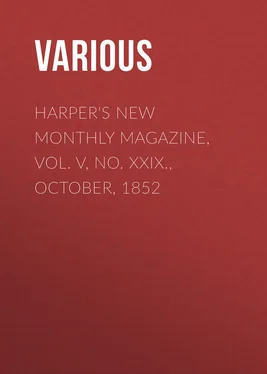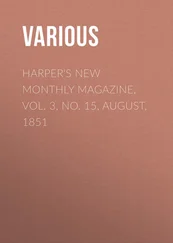Various - Harper's New Monthly Magazine, Vol. V, No. XXIX., October, 1852
Здесь есть возможность читать онлайн «Various - Harper's New Monthly Magazine, Vol. V, No. XXIX., October, 1852» — ознакомительный отрывок электронной книги совершенно бесплатно, а после прочтения отрывка купить полную версию. В некоторых случаях можно слушать аудио, скачать через торрент в формате fb2 и присутствует краткое содержание. Издательство: Иностранный паблик, Жанр: periodic, foreign_edu, на английском языке. Описание произведения, (предисловие) а так же отзывы посетителей доступны на портале библиотеки ЛибКат.
- Название:Harper's New Monthly Magazine, Vol. V, No. XXIX., October, 1852
- Автор:
- Издательство:Иностранный паблик
- Жанр:
- Год:неизвестен
- ISBN:нет данных
- Рейтинг книги:5 / 5. Голосов: 1
-
Избранное:Добавить в избранное
- Отзывы:
-
Ваша оценка:
- 100
- 1
- 2
- 3
- 4
- 5
Harper's New Monthly Magazine, Vol. V, No. XXIX., October, 1852: краткое содержание, описание и аннотация
Предлагаем к чтению аннотацию, описание, краткое содержание или предисловие (зависит от того, что написал сам автор книги «Harper's New Monthly Magazine, Vol. V, No. XXIX., October, 1852»). Если вы не нашли необходимую информацию о книге — напишите в комментариях, мы постараемся отыскать её.
Harper's New Monthly Magazine, Vol. V, No. XXIX., October, 1852 — читать онлайн ознакомительный отрывок
Ниже представлен текст книги, разбитый по страницам. Система сохранения места последней прочитанной страницы, позволяет с удобством читать онлайн бесплатно книгу «Harper's New Monthly Magazine, Vol. V, No. XXIX., October, 1852», без необходимости каждый раз заново искать на чём Вы остановились. Поставьте закладку, и сможете в любой момент перейти на страницу, на которой закончили чтение.
Интервал:
Закладка:
The Straits of Calais, which Napoleon contemplated crossing, notwithstanding the immense preponderance of the British navy filling the channel, is about thirty miles in width. There were four contingencies which seemed to render the project not impossible. In summer, there are frequent calms, in the channel, of forty-eight hours' duration. During this calm, the English ships-of-the-line would be compelled to lie motionless. The flat-bottomed boats of Napoleon, impelled by strong rowers might then pass even in sight of the enemy's squadron. In the winter, there were frequently dense fogs, unaccompanied by any wind. Favored by the obscurity and the calm, a passage might then be practicable. There was still a third chance more favorable than either. There were not unfrequently tempests, so violent, that the English squadron would be compelled to leave the channel, and stand out to sea. Seizing the moment when the tempest subsided, the French flotilla might perhaps cross the Straits before the squadron could return. A fourth chance offered. It was, by skillful combinations to concentrate suddenly in the channel a strong French squadron, and to push the flotilla across under the protection of its guns. For three years, Napoleon consecrated his untiring energies to the perfection of all the mechanism of this Herculean enterprise. Yet no one was more fully alive than himself to the tremendous hazards to be encountered. It is impossible now to tell what would have been the result of a conflict between the English squadron and those innumerable gun-boats, manned by one hundred and fifty thousand men, surrounding in swarms every ship-of-the-line, piercing them in every direction with their guns, and sweeping their decks with a perfect hail-storm of bullets, while, in their turn, they were run down by the large ships, dashing, in full sail, through their midst, sinking some in their crushing onset, and blowing others out of the water with their tremendous broadsides. Said Admiral Decris, a man disposed to magnify difficulties, "by sacrificing 100 gun-boats, and 10,000 men, it is not improbable that we may repel the assault of the enemy's squadron, and cross the Straits." "One loses," said Napoleon, "that number in battle every day. And what battle ever promised the results which a landing in England authorizes us to hope for!"
The amount of business now resting upon the mind of Napoleon, seems incredible. He was personally attending to all the complicated diplomacy of Europe. Spain was professing friendship and alliance, and yet treacherously engaged in acts of hostility. Charles III., perhaps the most contemptible monarch who ever wore a crown, was then upon the throne of Spain. His wife was a shameless libertine. Her paramour, Godoy, called the Prince of Peace, a weak-minded, conceited, worn-out debauchee, governed the degraded empire. Napoleon remonstrated against the perfidy of Spain, and the wrongs France was receiving at her hands. The miserable Godoy returned an answer, mean-spirited, hypocritical, and sycophantic. Napoleon sternly shook his head, and ominously exclaimed, "All this will yet end in a clap of thunder."
In the midst of these scenes, Napoleon was continually displaying those generous and magnanimous traits of character which were the enthusiastic love of all who knew him. On one occasion, a young English sailor had escaped from imprisonment in the interior of France, and had succeeded in reaching the coast near Boulogne. Secretly he had constructed a little skiff of the branches and the bark of trees, as fragile as the ark of bullrushes. Upon this frail float, which would scarcely buoy up his body, he was about to venture out upon the stormy channel, with the chance of being picked up by some English cruiser. Napoleon, informed of the desperate project of the young man who was arrested in the attempt, was struck with admiration in view of the fearless enterprise, and ordered the prisoner to be brought before him.
"Did you really intend," inquired Napoleon, "to brave the terrors of the ocean in so frail a skiff?"
"If you will but grant me permission," said the young man, "I will embark immediately."
"You must, doubtless, then, have some mistress to revisit, since you are so desirous to return to your country?"
"I wish," replied the noble sailor, "to see my mother. She is aged, poor, and infirm."
The heart of Napoleon was touched. "You shall see her," he energetically replied; "and present to her from me this purse of gold. She must be no common mother, who can have trained up so affectionate and dutiful a son."
He immediately gave orders that the young sailor should be furnished with every comfort, and sent in a cruiser, with a flag of truce, to the first British vessel which could be found. When one thinks of the moral sublimity of the meeting of the English and French ships under these circumstances, with the white flag of humanity and peace fluttering in the breeze, one can not but mourn with more intensity over the horrid barbarity and brutality of savage war. Perhaps in the next interview between these two ships, they fought for hours, hurling bullets and balls through the quivering nerves and lacerated sinews, and mangled frames of brothers, husbands, and fathers.
Napoleon's labors at this time in the cabinet were so enormous, dictating to his agents in all parts of France, and to his embassadors, all over Europe, that he kept three secretaries constantly employed. One of these young men, who was lodged and boarded in the palace, received a salary of 1200 dollars a year. Unfortunately, however, he had become deeply involved in debt, and was incessantly harassed by the importunities of his creditors. Knowing Napoleon's strong disapprobation of all irregularities, he feared utter ruin should the knowledge of the facts reach his ears. One morning, after having passed a sleepless night, he rose at the early hour of five, and sought refuge from his distraction in commencing work in the cabinet. But Napoleon, who had already been at work for some time, in passing the door of the cabinet to go to his bath, heard the young man humming a tune.
Opening the door, he looked in upon his young secretary, and said, with a smile of satisfaction, "What! so early at your desk! Why, this is very exemplary. We ought to be well satisfied with such service. What salary have you?"
"Twelve hundred dollars, sire," was the reply.
"Indeed," said Napoleon, "that for one of your age is very handsome. And, in addition, I think you have your board and lodging?"
"I have, sire?"
"Well, I do not wonder that you sing. You must be a very happy man."
"Alas, sire," he replied, "I ought to be, but I am not."
"And why not?"
"Because, sire," he replied, "I have too many English tormenting me. I have also an aged father, who is almost blind, and a sister who is not yet married, dependent upon me for support."
"But, sir," Napoleon rejoined, "in supporting your father and your sister, you do only that which every good son should do. But what have you to do with the English ?"
"They are those," the young man answered, "who have loaned me money, which I am not able to repay. All those who are in debt call their creditors the English ."
"Enough! enough! I understand you. You are in debt then. And how is it that with such a salary, you run into debt? I wish to have no man about my person who has recourse to the gold of the English . From this hour you will receive your dismission. Adieu, sir!" Saying this, Napoleon left the room, and returned to his chamber. The young man was stupefied with despair.
But a few moments elapsed when an aid entered and gave him a note, saying, "It is from Napoleon." Trembling with agitation, and not doubting that it confirmed his dismissal, he opened it and read:
"I have wished to dismiss you from my cabinet, for you deserve it; but I have thought of your aged and blind father, and of your young sister; and, for their sake, I pardon you. And, since they are the ones who must most suffer from your misconduct, I send you, with leave of absence for one day only, the sum of two thousand dollars. With this sum disembarrass yourself immediately of all the English who trouble you. And hereafter conduct yourself in such a manner as not to fall into their power. Should you fail in this, I shall give you leave of absence, without permission to return."
Читать дальшеИнтервал:
Закладка:
Похожие книги на «Harper's New Monthly Magazine, Vol. V, No. XXIX., October, 1852»
Представляем Вашему вниманию похожие книги на «Harper's New Monthly Magazine, Vol. V, No. XXIX., October, 1852» списком для выбора. Мы отобрали схожую по названию и смыслу литературу в надежде предоставить читателям больше вариантов отыскать новые, интересные, ещё непрочитанные произведения.
Обсуждение, отзывы о книге «Harper's New Monthly Magazine, Vol. V, No. XXIX., October, 1852» и просто собственные мнения читателей. Оставьте ваши комментарии, напишите, что Вы думаете о произведении, его смысле или главных героях. Укажите что конкретно понравилось, а что нет, и почему Вы так считаете.












